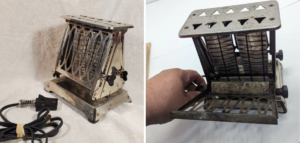Imagine a crisp Saturday morning in the 1950s, a time when families gathered and traditions were formed in the heart of the home: the kitchen. As the smell of freshly brewed coffee mixes with the cool morning air, you see a family member busy with a striking, shiny metal device. It is the stovetop toaster, an innovation that was considered a luxury at the time and played a central role in the morning ritual. The person at the stove carefully turns slices of bread, which slowly transform into perfect golden brown treats. This ritual was not just a method of preparing food; it was an art form that required patience and precision, making every breakfast a special occasion

Reflection
The stovetop toaster was an example of minimalism and… functionality, but its true impact was in the way it enriched everyday family life.
Unlike today’s pop-up toasters, using this appliance required direct contact with the stove, with the bread carefully placed on wire racks and cooked to perfect crispiness by the stove’s heat.
This action, although simple, involved an element of tension as one hoped that the bread would not burn.
The final reward, spreading butter on a warm, crispy slice, was a moment of pure joy and satisfaction.
Meaning
In the context of the 20th century, kitchen gadgets such as the toaster not only symbolized a period of ingenuity and simplicity, but also represented the cultural and social dynamics of the time.
These devices were more than tools; they were a bridge to an era when each domestic article told a story and had emotional value.
Users were encouraged to be engaged and attentive with each use, turning toasting bread into an interactive and personal experience.
This process was not just a housekeeping task; it was a way to connect with family life and the simpler pleasures of existence.
Tools
These toasters remind us of a time when life seemed slower and perhaps more meaningful.
Every meal was cherished, every moment shared.
The sounds of the wire grills, the smell of toast, and the chatter of family-eleden in the kitchen contributed to a feeling of warmth and connection.
These moments, which turned simple tasks like making breakfast into shared experiences, were fundamental to strengthening bonds between family members.
Past
Next time you come across an old stovetop toaster, let it take you back to those special mornings.
Remember the warmth of the kitchen, the pleasure of perfectly toasted bread, and the simplicity of being with your family.
These classic pieces are not just relics of the past, but powerful reminders of the enduring charm of times gone by, serving as a bridge to our most cherished memories.
Main points of the article: ”


A Reflection of Family Values and Traditions: The stovetop toaster was a central element in American kitchens and played an important role in shaping family memories.
A Symbol of Resourcefulness and Simplicity: These appliances symbolized an era when simplicity and craftsmanship were central to household technology.
The Power of Shared Experiences: They remind us of the value of spending time together and how even simple tasks can help build deeper family bonds.
Nostalgic and Cultural Significance: The toaster represents an era when family and functionality went hand in hand, and is enduringly loved in the hearts of many as an icon of domestic harmony.
Share now: 


The content of this article was compiled for the Facebook page: inspire me & Uplift Me . You are more than welcome to follow them on Facebook.





